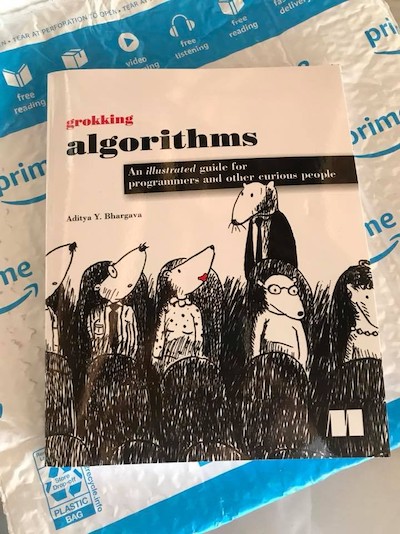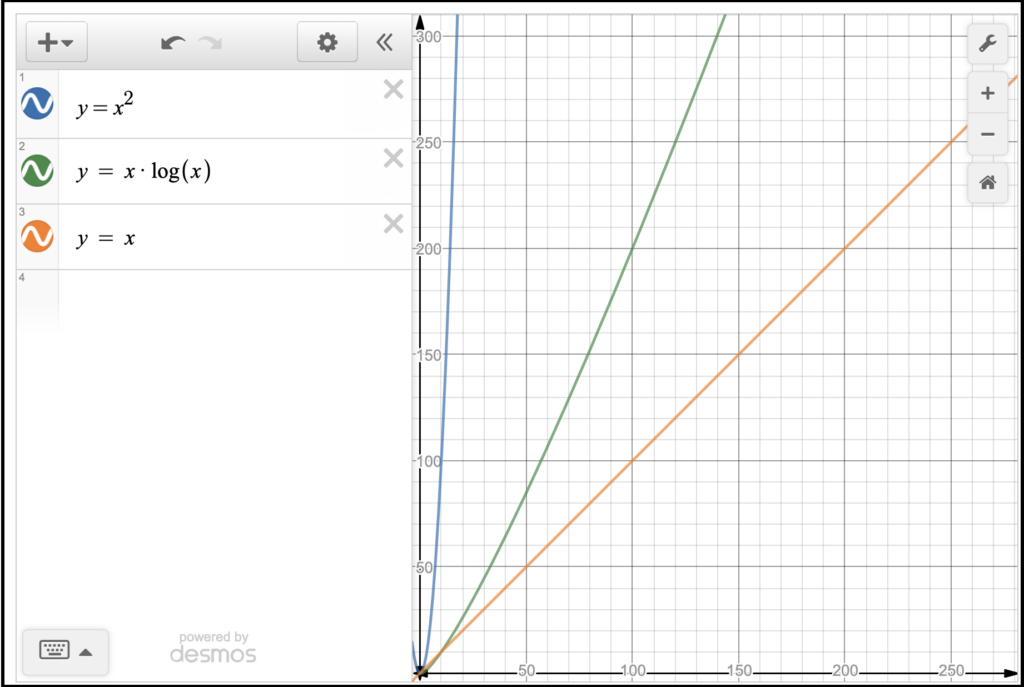
After reading the very popular book, grokking algorithms,
Will be blogging about algorithms and data structures… the book is very informative and easy to digest.

It’s advised you get yourself familiar with data structures before starting to solve problems… I will not go into details, my advice is to try to solve the problems without looking at the solutions
Problem: 1
return a pair of 2 distinct values (if any) that sum up to a target number, from a nonempty array that has distinct integers.
Different Solutions with different time complexities
// Time: O(n^2)
func solution1(_ array: [Int], _ targetSum: Int) -> [Int] {
for i in 0 ..< array.count-1 {
for j in i+1 ..< array.count {
if array[i] + array[j] == targetSum {
return [array[i],array[j]]
}
}
}
return []
}
// Time: O(n^2)
func solution2(_ array: [Int], _ targetSum: Int) -> [Int] {
for i in array {
for j in array {
if (i != j) && targetSum == (i + j) {
return [i,j]
}
}
}
return []
}
// Time: O(n*log(n))
func solution3(_ array: [Int], _ targetSum: Int) -> [Int] {
let sorted = array.sorted()
var leftPointer = 0
var rightPointer = sorted.count - 1
while leftPointer < rightPointer {
let leftMost = sorted[leftPointer]
let rightMost = sorted[rightPointer]
let currentSum = leftMost + rightMost
if currentSum == targetSum {
return [leftMost, rightMost]
} else if currentSum < targetSum {
leftPointer = leftPointer + 1
} else if currentSum > targetSum {
rightPointer = rightPointer - 1
}
}
return []
}
// Time: O(n)
func solution4(_ array: [Int], _ targetSum: Int) -> [Int] {
var numberDictionary = [Int: Bool]()
for number in array {
let mayMatch = targetSum - number
if let exists = numberDictionary[mayMatch], exists {
return [mayMatch, number]
} else {
numberDictionary[number] = true
}
}
return []
}I’m not going to explain each code, you comment here if you have a question, will leave the analysis to you, doing a simple benchmark on a 100,000 values array, we can see these results
solution1: 31.88 s.
solution2: 18.41 s.
solution3: 0.38 s.
solution4: 0.20 s. 🏆

functions used for benchmarking
func printTimeElapsedWhenRunningCode(title:String, operation:()->()) {
let startTime = CFAbsoluteTimeGetCurrent()
operation()
let timeElapsed = CFAbsoluteTimeGetCurrent() - startTime
print("Time elapsed for \(title): \(timeElapsed) s.")
}
func timeElapsedInSecondsWhenRunningCode(operation: ()->()) -> Double {
let startTime = CFAbsoluteTimeGetCurrent()
operation()
let timeElapsed = CFAbsoluteTimeGetCurrent() - startTime
return Double(timeElapsed)
}
Problem: 2
Given 2 non empty arrays, write a function that determines if the second array is a subsequence of array 1.
⚠️: Keep in mind, subsequence is not the same as subarray.
// Time: O(n)
func isValidSubsequence_solution1(_ array: [Int], _ sequence: [Int]) -> Bool {
// sequence is empty
if (sequence.count == 0) {
return false
}
// if arrays are equal, directly return true.
if (array == sequence) {
return true
}
// the sequence is larger than the array, return false.
if (sequence.count > array.count) {
return false
}
var arrIdx = 0
var seqIdx = 0
while arrIdx < array.count, seqIdx < sequence.count {
if array[arrIdx] == sequence[seqIdx] {
seqIdx += 1
}
arrIdx += 1
}
return seqIdx == sequence.count
}
// Time: O(n)
func isValidSubsequence_solution2(_ array: [Int], _ sequence: [Int]) -> Bool {
// sequence is empty
if (sequence.count == 0) {
return false
}
// if arrays are equal, directly return true.
if (array == sequence) {
return true
}
// the sequence is larger than the array, return false.
if (sequence.count > array.count) {
return false
}
var seqIdx = 0
for value in array {
if seqIdx == sequence.count {
break
}
if value == sequence[seqIdx] {
seqIdx += 1
}
}
return seqIdx == sequence.count
}
test results for these arrays
let myArray1 = Array(stride(from: -900005, through: 900005, by: 1))
let myArray2 = Array(stride(from: -900000, through: 900000, by: 1))
Time elapsed for solution1: 28.102 s.
Time elapsed for solution2: 14.446 s. 🏆
can you guess why Solution 2 is better, even though they have same time complexity? 🤓
Problem 3:
Write a function that takes in a non-empty array of integers that are sorted in ascending order and returns a new array with the squares of the original integers also sorted in ascending order.
let me add 4 solutions along with explanation.
// Bad solution, appending is expensive, it's better to init an array with the length
func sortedSquaredArray_solution1(_ array: [Int]) -> [Int] {
var sortedSquares = [Int]()
for value in array {
sortedSquares.append(value * value)
}
return sortedSquares.sorted()
}
// Time: O(nlog(n)) | Space O(n)
func sortedSquaredArray_solution2(_ array: [Int]) -> [Int] {
var sortedSquares = Array(repeating: 0, count: array.count)
for (idx, value) in array.enumerated() {
sortedSquares[idx] = value * value
}
return sortedSquares.sorted()
}
// same as before, but higher order functions is tuned for high performance
func sortedSquaredArray_solution3(_ array: [Int]) -> [Int] {
return array.map { $0 * $0 }.sorted()
}
// Time: O(n) | Space O(n)
func sortedSquaredArray_solution4(_ array: [Int]) -> [Int] {
var sortedSquares = Array(repeating: 0, count: array.count)
var smallerValueIdx : Int = 0
var largerValueIdx : Int = array.count - 1
for idx in stride(from: array.count - 1, through: 0, by: -1) {
let smallerValue = array[smallerValueIdx]
let largerValue = array[largerValueIdx]
if abs(smallerValue) > abs(largerValue) {
sortedSquares[idx] = smallerValue * smallerValue
smallerValueIdx += 1
} else {
sortedSquares[idx] = largerValue * largerValue
largerValueIdx -= 1
}
}
return sortedSquares
}
for the following input
let myArraySortedSquares = Array(stride(from: -5000000, through: 5000000, by: 1))
Time elapsed for solution1: 6.786 s.
Time elapsed for solution2: 6.275 s.
Time elapsed for solution3: 5.106 s.
Time elapsed for solution4: 1.637 s. 🥇
Problem 4:
2 chess teams, competed for 1,000,000 times 🧐
given a 2D array of matches [host, guest]
Example
[[“Nepomniachtchi”, “Grischuk”], [“Karjakin”, “Grischuk”], [“Nepomniachtchi”, “Keymer”], [“Ding Liren”, “Grischuk”], [“Karjakin”, “Andreikin”], [“Carlsen”, “Gukesh D”], [“Aronian”, “Gukesh D”], [“Carlsen”, “Andreikin”], [“Nepomniachtchi”, “Gukesh D”], [“Aronian”, “Gukesh D”]]
and an array of results, where 1 means host team won
Example
[1, 1, 0, 0, 0, 0, 0, 1, 1, 1]
find the winning player,
** for sake of simplicity, assume there is no draw in total points between players.
import Foundation
let HOST_TEAM_WON = 1
let WIN_POINTS = 1
// O(n) time | O(k) space , where n: are matches and k is the number of teams
func chessWinner(_ matches: [[String]], _ results: [Int]) -> String {
var bestPlayer = ""
var scores = [String: Int]()
scores[bestPlayer] = 0
for (idx, match) in matches.enumerated() {
let (host, guest) = (match[0], match[1])
let winning = (results[idx] == HOST_TEAM_WON) ? (host) : (guest)
if scores[winning] == nil { scores[winning] = 0}
scores[winning] = scores[winning]! + WIN_POINTS
if scores[winning]! > scores[bestPlayer]! {
bestPlayer = winning
}
}
return bestPlayer
}
func generateData() -> ([[String]] , [Int]) {
let players1 = ["Carlsen", "Ding Liren", "Nepomniachtchi", "Karjakin", "Aronian"]
let players2 = ["Keymer", "Vitiugov", "Gukesh D", "Andreikin", "Grischuk"]
var matches = [[String]] ()
var results = [Int]()
let possibleResults = [0,1]
for _ in 0 ..< 10 {
matches.append([players1.randomElement() ?? "", players2.randomElement() ?? ""])
results.append(possibleResults.randomElement() ?? 0)
}
print(matches)
print(results)
return (matches, results)
}
func problem_04_solutions() {
let data = generateData()
printTimeElapsedWhenRunningCode(title:"solution1") {
let winner = chessWinner(data.0, data.1)
print(winner)
}
}